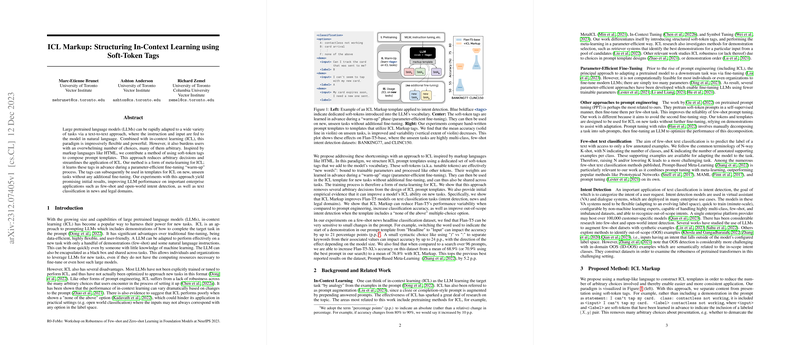Overview of In-Context Learning and Challenges
In-Context Learning (ICL) with LLMs is a technique where users prompt a LLM with examples to perform new tasks without fine-tuning the model's parameters. This method is flexible, user-friendly, and data-efficient. However, the process is sensitive to how the prompts are structured, leading to highly variable outcomes based on seemingly trivial changes. This can make ICL unreliable and complex for users to navigate.
Proposed Solution: ICL Markup
To mitigate these issues, the paper introduces a novel approach akin to a markup language, named ICL Markup, which structures the in-context learning prompts using soft-token tags embedded in the model's vocabulary. These tags are like new words that can be trained during a parameter-efficient warm-up stage. Once learned, they facilitate ICL without further fine-tuning and across various tasks, acting as a form of meta-learning.
Experiments and Results
The effectiveness of ICL Markup is tested through a series of experiments:
- It proves to be advantageous in few-shot and highly multi-class intent detection tasks, enhancing the adaptability of the LLMs.
- In text classification tasks with varying complexities, including news headlines and legal texts, ICL Markup demonstrates improvements in performance and consistency.
- A particular highlight is the application to intent detection, where the method supports models in recognizing both in-scope and out-of-scope intents, a crucial feature for practical use in virtual assistants.
- Beyond the domain of intent detection, the utility of soft-token tags is evident in legal text classification tasks, suggesting their potential for cross-domain applications.
Limitations and Future Directions
While promising, the current research is limited to particular model sizes and primarily classification tasks. Future work could extend to larger and more diverse model architectures, explore a wider range of applications, and refine the approach by introducing domain-specific tags like one indicating out-of-scope responses.
Implications for Robust In-Context Learning
ICL Markup represents a step toward robust and structured in-context learning. By standardizing the prompt construction process, the approach reduces the burden of prompt engineering on users, allowing them to focus on the content and application of the models rather than the intricacies of the prompt design. This innovation stands to make LLMs more accessible and effective for real-world applications across various industries and domains.
